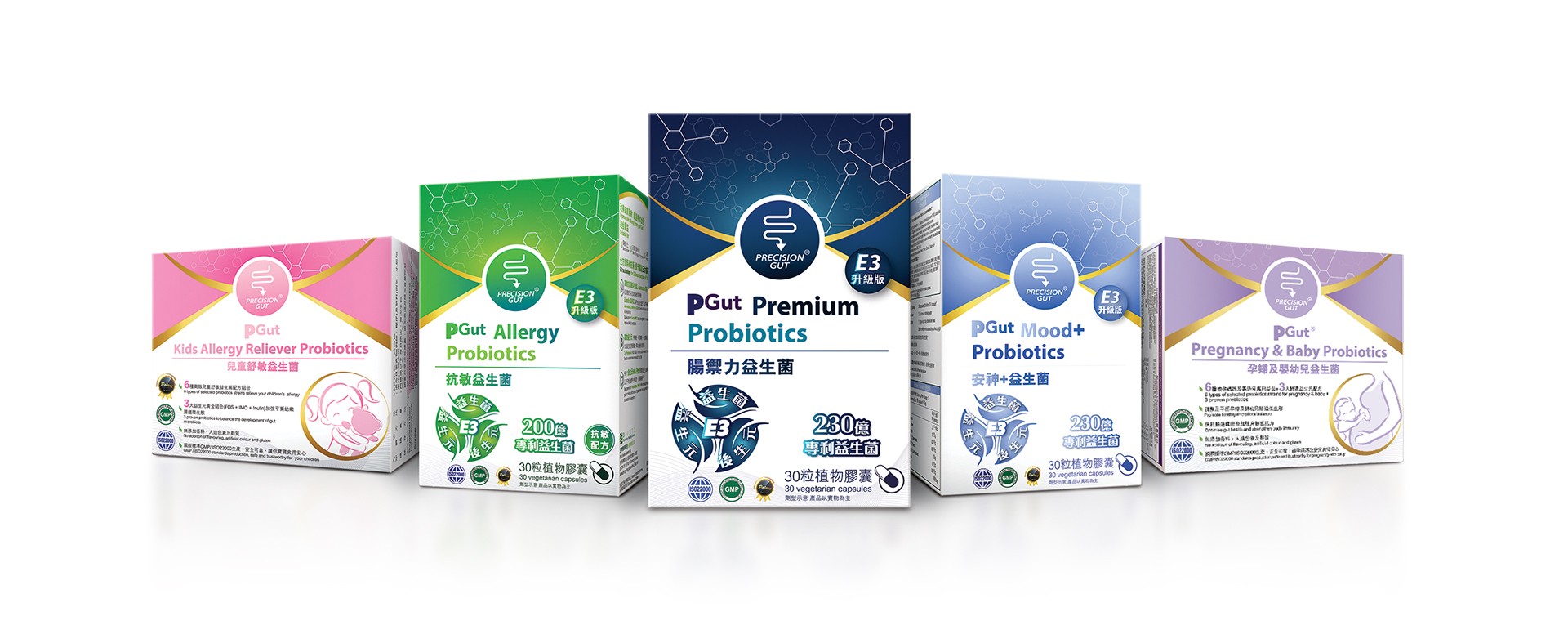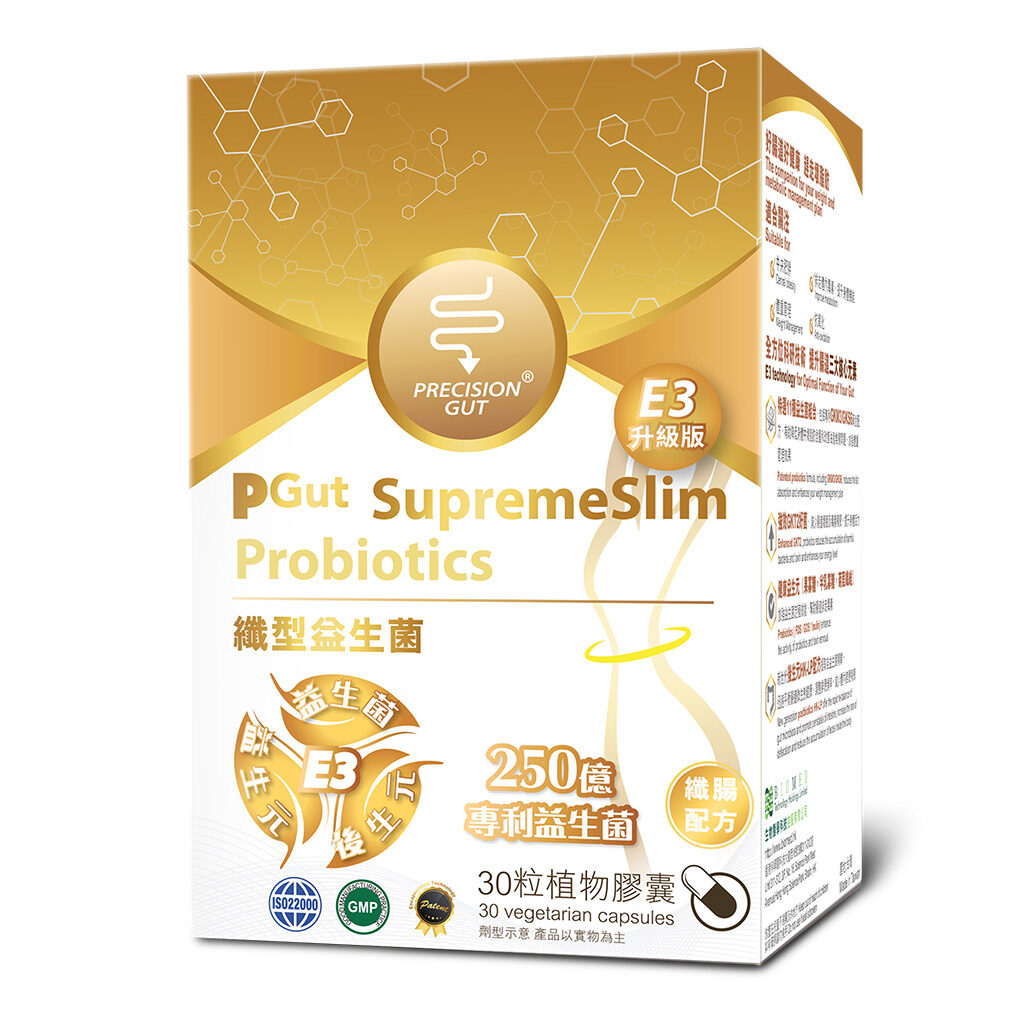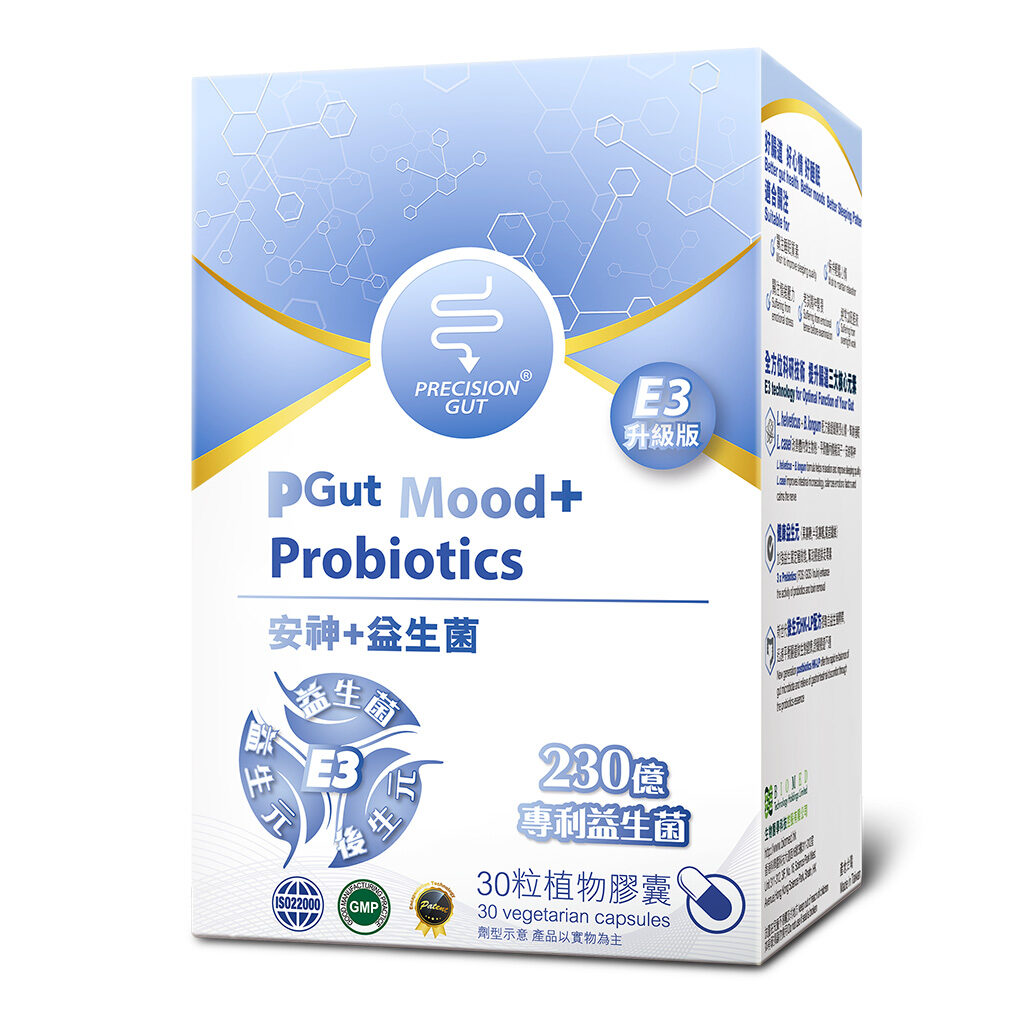腸道健康
腸道健康與亞健康問題的關係
研究顯示,不同都市常見的亞健康問題和腸道菌群失衡具關聯性,其中包括:濕疹敏、銀屑病、慢性便秘、腹瀉、肥胖超重、糖尿病、高血壓等。有研究更指出,其患者群組所缺乏的腸道「益生菌」皆有所不同,顯示要改善亞健康問題,可從精準補充相應益生菌開始。



腸道健康
研究顯示,不同都市常見的亞健康問題和腸道菌群失衡具關聯性,其中包括:濕疹敏、銀屑病、慢性便秘、腹瀉、肥胖超重、糖尿病、高血壓等。有研究更指出,其患者群組所缺乏的腸道「益生菌」皆有所不同,顯示要改善亞健康問題,可從精準補充相應益生菌開始。



益生菌的作用
益生菌最直接的好處,是在改善腸道環境和消化系統方面,她們產生多種酶消化食物,製造很多人體需要的維生素、葉酸、胺基酸等物質,又能夠分解有害物質和代謝藥物,並保持腸道細胞的緊密連接,阻止有害細菌和病毒入侵。益生菌可以緩和腸胃炎和腹瀉。
益生菌在調控免疫系統和抗過敏方面相當出色,控制發炎性腸病就是一個例子。目前有大量關於益生菌的科學研究佐證益生菌應用在跟免疫系統和過敏有關的疾病,例如異位性皮膚炎(atopic dermatitis)、哮喘(asthma)、過敏性鼻炎(allergic rhinitis)、食物過敏等等。
肥胖和糖尿病是非常常見的慢性疾病,都是因為攝取過多能量,引致中央能量代謝失調的結果。益生菌能夠調控腸胃激素的分泌,降低血糖,維持糖和脂肪代謝的體內平衡,並降低膽固醇積聚的風險。
有研究發現益生菌會產生神經傳導物質(neurotransmitters),包括色胺酸(tryptophan)、γ-胺基丁酸(γ-aminobutyric acid)、血清素(serotonin)、去甲腎上腺素(noradrenaline)等等,有助減輕焦慮和憂鬱症狀,甚至改善自閉症。
PGut益生菌
PGut益生菌 E3系列特別採用最多臨床研究數據認可的後生元 HK-LP(HK L.plantarum)。透過將益生菌加熱滅活(heat killed)製成,HK-LP後生元除可迅速加強益生菌功效外,亦能模擬活菌功效。

寡醣 FOS + GOS + 菊苣纖維 (Inulin)輔助益菌成長 PGut E3系列具有三重益生元,能充分補充益生菌的成長養分,幫助它們在腸道中順利定殖,大大提升其活性效能,並促進腸道蠕動,排走毒素。
精選益生菌菌株,抗胃酸均達95%,好菌直達腸道,精準改善相關健康問題。
針對香港人體質弱點研發
腸道健康直接影響免疫力,PGut 益生菌改善腸道功能
精明地攝取益生菌





參考文獻
Akkesheh G, Kashani-Poor Z, Tajabadi-Ebrahimi M, et al. (2019). Clinical and metabolic response to probiotic administration in patients with major depressive disorder: a randomized, double-blind, placebo-controlled trial. Nutrition 32 (3): 315-320. https://doi.org/10.1016/j.nut.2015.09.003
Chao L, Liu C, Sutthawongwadee S, et al. (2020). Effects of probiotics on depressive or anxiety variables in healthy participants under stress conditions or with a depressive or anxiety diagnosis: a meta-analysis of randomized controlled trials. Front Neurol 11: 421. https://doi.org/10.3389/fneur.2020.00421
Foster JA and McVey Neufeld KA. (2013). Gut-brain axis: how the microbiome influences anxiety and depression. Trends Neurosci 36 (5): 305-312. https://doi.org/10.1016/j.tins.2013.01.005
Huang TT, Lai JB, Du YL, et al. (2019). Current understanding of gut microbiota in mood disorders: an update of human studies. Front Genet 10: 98. https://doi.org/10.3389/fgene.2019.00098
Messaoudi M, Violle N, Bisson JF, et al. (2011). Beneficial psychological effects of a probiotic formulation (Lactobacillus helveticus R0052 and Bifidobacterium longum R0175) in healthy human volunteers. Gut Microbes 2 (4): 256-261. https://doi.org/10.4161/gmic.2.4.16108
Rudzki L, Ostrowska L, Pawlak D, et al. (2019). Probiotic Lactobacillus plantarum 299v decreases kynurenine concentration and improves cognitive functions in patients with major depression: a double-blind, randomized, placebo controlled study. Psychoneuroendocrinology 100: 213-222. https://doi.org/10.1016/j.psyneuen.2018.10.010
Wallace CJK and Milev R. (2017). The effects of probiotics on depressive symptoms in humans: a systematic review. Ann Gen Psychiatry 16: 14. https://doi.org/10.1186/s12991-017-0138-2
Wallace CJK, Foster JA, Soares JN, et al. (2020). The effects of probiotics on symptoms of depression: protocol for a double-blind randomized placebo-controlled trial. Neuropsychobiology 79: 108-116. https://doi.org/10.1159/000496406
Wallace CJK and Milev RV. (2021). The efficacy, safety, and tolerability of probiotics on depression: clinical results from an open-label pilot study. Front Psychiatry 12: 618279. https://doi.org/10.3389/fpsyt.2021.618279